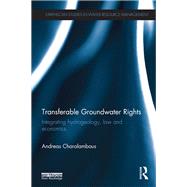Transferable Groundwater Rights: Integrating Hydrogeology, Law and Economics
, by Charalambous; Andreas N.- ISBN: 9780415507240 | 0415507243
- Cover: Hardcover
- Copyright: 3/26/2013
The principle of Transferable Water Rights (TWR) is that by making water rights capable of being traded in the market, water resources can be used more sustainably and efficiently. Water would achieve its economic value, by switching from the high volume-low value irrigation, which is prevalent with many farmers, to low volume-high value urban supply or the growing of intensive horticultural or cash crops. However, sceptics point out that free markets do not usually best serve the environment, the poor and the conservation of resources. This book discusses TWR in their broader context. Thus, whilst the focus is primarily on legal and economic aspects, there is also a detailed description of the physical aspects of groundwater, which non technical readers should find useful. Based on a detailed review of international experiences, the author presents a critical assessment of whether water rights trading is the answer to sustainable groundwater management, or fraught with potential dangers to the environment and social equity, especially in the light of climate change. It concludes that TWR potentially offer a better alternative to land-based water rights systems, especially for groundwater. But it casts serious doubt as to whether water rights trading can achieve water resources sustainability, environmental protection and social equity. A generic model is provided to assist those involved in water resources management and planning of the introduction of TWR.






